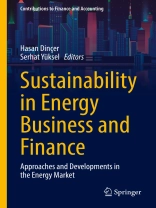This edited volume seeks to identify the sustainability issues currently affecting the energy business and finance. For this purpose, a broad range of perspectives on sustainability issues in the energy business and finance are taken into consideration in the context of renewable business projects. In turn, several novel strategies from the energy business and finance are illustrated with regard to sustainable organizational factors, technological infrastructure, financial facilities, economic development, and investment potential. Comparing and contrasting different sustainability perspectives can help to develop the most appropriate and successful business strategies for the sustainable energy business and finance. This book presents multidimensional analyses of sustainability issues with regard to renewable energy projects and identifies the most promising strategies, as well as efficient market conditions for the energy business.
Spis treści
Chapter 1. Creation of Energy Risk Insurance System.- Chapter 2. ICT Trade and Energy Transition in the BRICS Economies.- Chapter 3. Features of the Emergence and Functioning of the Energy Uncertainty Management in Russia.- Chapter 4. Are Changes in Electricity Production Perpetual or Temporary: An Evidence from Emerging Countries.- Chapter 5. Financial Evaluation of Energy Investments in Russia.- Chapter 6. Strategic Talent Perception in the Energy Sector.- Chapter 7. Relationships Between Energy Efficiency on Output and Energy Efficiency on Carbon Emission.- Chapter 8. Examination of the Relationship Between Economic Growth, Natural Resources, Energy Consumption, Urbanization and Capital.- Chapter 9. Analysis of the Activities of the Energy Risks Insurance Agency in Russia.- Chapter 10. Development, Trade Openness and Pollution: Is There Any Threshold?.- Chapter 11. Analysis of the Functioning of the Energy Safety Conditions.- Chapter 12. How to Improve Energy Investments in Russia.-Chapter 13. Digital Activist Movements for Energy Resources: The Case of Greenpeace Turkey.- Chapter 14. The stability of Financial Institutions and Counterparties.- Chapter 15. Roles of FDI, Energy and Carbon Emission in Convergence or Divergence of Income in BRICS Nations in Neoclassical Growth Framework.- Chapter 16. Key Issues for the Improvements of Shallow Geothermal Investments.- Chapter 17. Religious Principles for the Development of Energy Investments.- Chapter 18. Implications of Energy Subsidies from Economic Standpoint.
O autorze
Hasan Dinçer is a Professor of Finance at Istanbul Medipol University, Faculty of Economics and Administrative Sciences, Istanbul, Turkey.
Serhat Yüksel is an Associate Professor of Finance at Istanbul Medipol University, Faculty of Economics and Administrative Sciences, Istanbul, Turkey.












